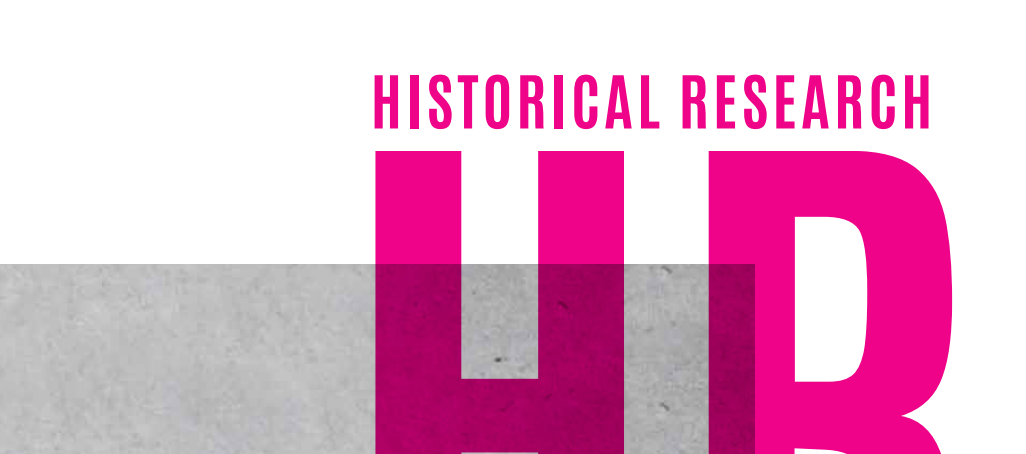By Julie Spraggon
February 2020 sees publication of the first issue of a new look Historical Research, now published by Oxford University Press. Historical Research is the IHR’s academic journal, published in February, May, August and November of each year.
Here, Dr Julie Spraggon, the journal’s editor considers some of the new features and future directions for the journal following its move to OUP.
We are pleased to announce the publication of the first issue of the IHR’s renowned journal, Historical Research (HR), with our new publishing partner Oxford University Press.
Established as the Bulletin of Historical Research in 1923, the journal has grown over the last century from a means of communicating the work of the Institute into a generalist journal producing some forty substantial research articles a year for an international readership.
What makes Historical Research special?
Those of us who work on the journal pride ourselves on the service we provide to our authors and our readers, indeed to the history profession at large. We are proud of the quality and variety of our content – fully peer reviewed articles on a wide range of national and international research topics from 600 C.E. to the present day.
We encourage interdisciplinary research and are particularly committed to helping Early Career Researchers. Our editorial team are friendly and approachable, and we hold to a long tradition of fastidious, high quality editing and production.

What’s new for Historical Research?
First, of all we are very excited to introduce our new international editorial board. Representing a wide-range of historical fields and national and international institutions, the new board members will be ambassadors for the journal, supporting us with their expertise and experience and helping us to keep the journal in touch with emerging topics in the historical profession.
For the coming years we have ambitions to build on our strengths and to expand them. We aim to encourage innovation, explore new forms of research and increase the diversity of our content and authorship. We particularly welcome contributions from BAME scholars, scholars considering questions related to race and migration, or research focused on the global south.
These ambitions and new directions are set out by the IHR’s director Professor Jo Fox in her Editorial to the February 2020 issue.
Historical Research has an ambitious agenda to promote methodological and disciplinary advancement, provoke fresh debates, and encourage new ways of historical thinking and ‘knowing’. It will reflect the fact that the discipline is enriched by diversity and inclusion, both in its focus, content and method, and in its scholars.
Historical Research will be a platform for the community of historians to give voice to those new perspectives and debates that will shape the discipline – accessible to and representative of all, and embracing the richness and diversity of historical understanding.
Jo Fox, editorial, February 2020
We are also pleased to present a fresh and contemporary new look for the journal itself (complete with full colour images), as well as a lively new website at Oxford Academic. Advance articles are available with email notifications via OUP’s alerts service.
Latest issue
Our February 2020 issue – the first with OUP – is now available. Highlights from this issue include:
- Jo Fox on ‘Fake news – the perfect storm: historical perspectives’ (a version of Jo’s inaugural lecture at the University of London in October 2019) [free access]
- Emily A. Winkler, ‘Imagining the medieval face of battle: the ‘Malfosse’ incident and the battle of Hastings, 1066–1200’
- Sarah Johaneson, ‘That silken Priest’: Catholic disguise and anti-popery on the English Mission (1569–1640)
- Brett Holman, ‘The meaning of Hendon: the Royal Air Force Display, aerial theatre and the technological sublime, 1920–37’
- Tony Shaw and Giora Goodman, ‘Star power: Kirk Douglas, celebrity activism and the Hollywood-Israel connection’

About Historical Research
Historical Research (HR) is the IHR’s academic journal. Founded in 1923, it is today an important and influential voice in historical debate, with a focus on innovative work by early career researchers.
Historical Research is published by Oxford University Press with an agenda to explore and foster new forms of historical thinking and practice. The journal supports annual prizes for early career historians and the annual Historical Research Lecture in historical methods, sponsored by OUP and delivered in July.

Dr Julie Spraggon is executive editor of Historical Research and Head of Publications at the IHR.

